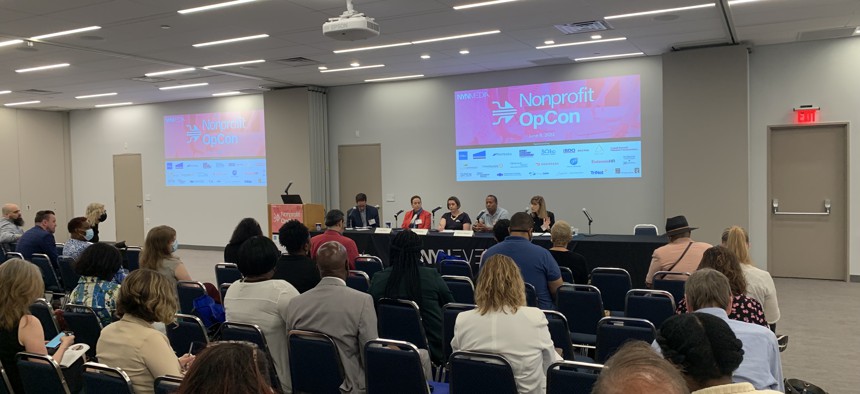Nonprofit OpCon returns, focusing on processes and streamlining operations post-COVID-19
The annual New York Nonprofit Media event gathered industry experts to discuss strategies for organizations as they emerge from the challenges of the pandemic.

Ralph R. Ortega
New York Nonprofit Media held its 2022 Nonprofit OpCon Thursday, marking the event’s return in-person since the onset of COVID-19 and gathering industry experts to discuss how organizations can streamline processes and operations, especially now as the pandemic has begun to subside.
The annual conference held at Hebrew Union College in Manhattan focused on strategies and best practices for executive leadership, operations, IT, risk, finance, HR, among other operations areas. Attendees also were briefed on new industry standards and guidelines around applying for public funds.
Gary Bagley, adjunct professor of International and Public Affairs at Columbia University School of International and Public Affairs and Baruch College of The City University of New York, delivered welcome remarks and served as emcee for the event. Speaking with NYN Media just before the start of the daylong conference, Bagley described what amounted to a perfect storm of factors that have impacted the nonprofit sector as it now leaves COVID-19 behind.
“The biggest issues that nonprofits are facing right now is, after having had to streamline and rethink services in the face of the pandemic, many of them were digging into their rainy day funds to do that, and now they're emerging at a time when there is incredible inflation. There is the Great Resignation. And the combination of the two things is also amongst the factors leading to an incredible increased need for services,” Bagley said. “We need to work smarter now more than ever to make sure that we deliver as much service as we can, of the highest quality, while caring for our own people.
Add to that the ongoing challenges of working with New York City’s procurement process. When asked, Bagley said progress toward improving the process has been slow. “I have a fair number of colleagues who deal with procurement process regularly, and I would say I'm hearing continued frustration,” he told NYN Media. “They do see that the city is working and has been trying to make that process better. But frankly, it was so overwrought and difficult to manage for so many years that I think people are still eager for more change.”
Improving on the procurement process remains a priority, he stressed. “The CEOs who need to be making calls, because they're trying to meet cashflow, make payroll because their contracts haven't been paid, that’s not what we want leaders doing, right? We want them leading. So the more we can lift people up and out of the procurement process, the better for services in general,” Bagley said.
“Then of course the final really big pressure is just the frontline pay for our employees, and that is contract related,” he added. “How much can we pay? A lot of the resignation and the turnover in our sector, which is notoriously high, is related to salaries that aren't really livable. Good hearted people do this work for a couple years and then, frankly, they go off and find something that pays them reasonably well.”
Among the event’s moderators, Adam Doyno, founding executive director of the CUNY School of Public Health Foundation and director of development for the CUNY School of Public Health, told attendees of his own recent operations experiences.
“I started this job four-and-a-half years ago. Now, four-and-a-half years ago, if you would have told me that about a year-and-a-half into my tenure that I was going to be the executive director of the Public Health Foundation during a once in a generation pandemic, I would have told you that you're out of your mind,” he told the audience.
“I also am the founding executive director of this institution. It's a small shop, we're a five-year-old school,” Doyno added. “So when you think about this, it's standing up all these operations, standing up all these processes, doing it for a year of my four-and-half year tenure, and exclusively by myself. This has been a job that's required flexibility, that's required innovation, that's required finding ways to streamline and improve process, to refine business operations, to build partnerships that allow me to be able to do my job, which is to raise money to benefit the school of public health, students and the communities that we serve.”
Doyno suggested to attendees going into the first panel that while their discussions would focus on “the streamlining of process” and finance, he recommended instead that the term “business operations” be their take away.
“It's everything that goes into running an organization, it's finance, sure. It's accounting, expense management, audit, oversight, contracted, budgeting, planning, operating payments. There's a lot that goes into this, even as a fundraiser, right?” he asked. “Receiving donations, and the process by which you go about doing, making sure that everything you do has accountability to oversight.”
“I will tell you that as the executive director of my organization that I've seen this go really well. And I've seen this go really poorly. And I've unfortunately been in the middle of both of those,” he told the audience. “It's so important that you take in what everyone's going to talk to you about today, because these are all experts and they have quite a bit that they can share to help you improve the way in which your organizations do business.”